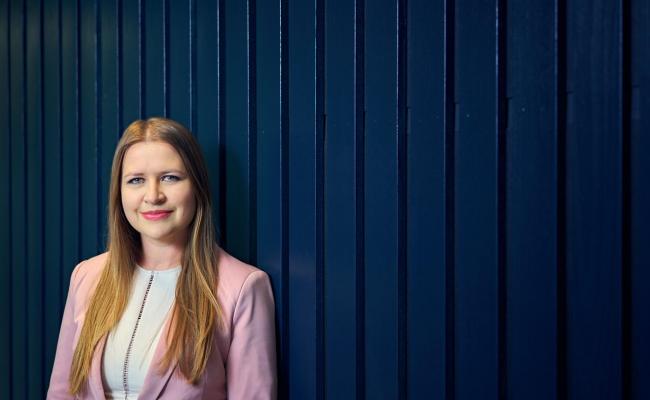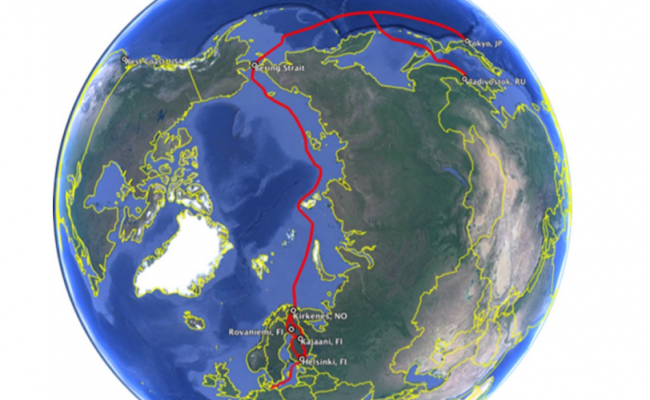Arctic 2050: Mapping the Future of the Arctic
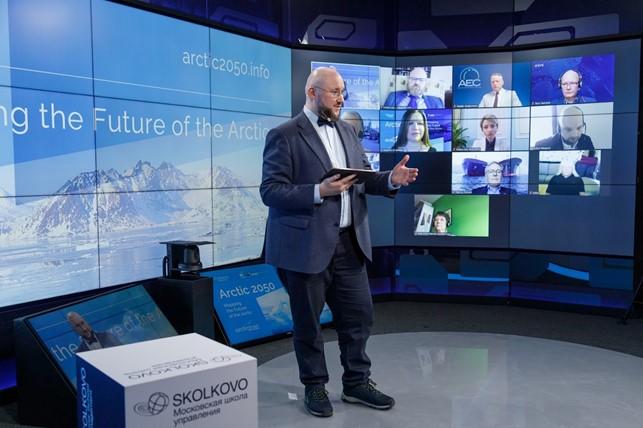
“Arctic 2050: Mapping the Future of the Arctic” side event. (Photo Moscow School of Management SKOLKOVO)
Commentary: “Arctic 2050: Mapping the Future of the Arctic” side event presents views on business, social and environmental Arctic development.
On 23, April a side event “Arctic 2050: Mapping the Future of the Arctic” took place as part of the High North Dialogue Conference in Bodo. The event featured policy-makers, businesses, NGOs and academic speakers discussing opportunities for the sustainable future of Arctic development.
Future scenarios report “Arctic 2050” co-written by Nord University and Skolkovo School of Management served as a basis for discussion. Four scenarios of the Arctic development represent road marking that is meant for guiding, supporting decision making and fostering dialogue between stakeholders. Scenarios incorporate social, economic and environmental dimensions.
In “Dark Ages” the Arctic in 2050 is a devastated and depopulated region that failed to develop a functioning institutional environment for resource extraction and business development, in “The Age of Discovery” economic considerations are prioritised over social and environmental concerns leading to ecosystems’ degradation in the Arctic.
In the “Romanticism” scenario the Arctic has the strictest environmental regulation on the planted with very limited industrial development allowed. Finally, the “Renaissance” scenario envisions Arctic development that has a technological and innovative environment, diversified economy and functioning environmental regulation, thriving population and cities, hence performing well on all three dimensions of sustainability.
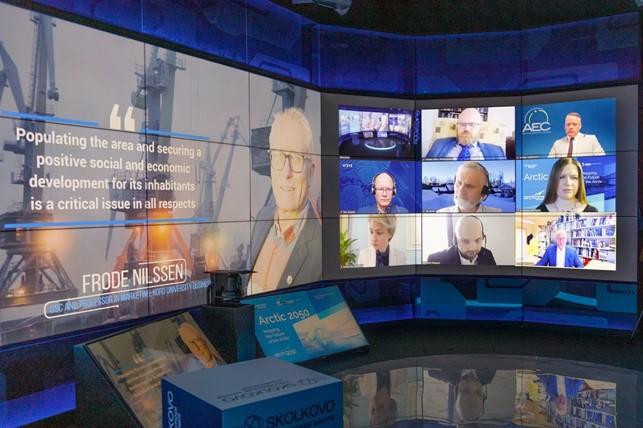
Arctic 2050 side event. (Photo: Moscow School of Management SKOLKOVO)
Frode Nilssen, Professor in Marketing from Nord University Business School opened the discussion by addressing the future challenges and opportunities of Arctic development in light of the Blue Economy, growing world population and role of the Arctic as a provider of natural and bioresources in this equation. He posed the question: “How will the cost of doing business in the Arctic develop in the future?”
Business in the Arctic
Heidar Gudjonsson, Chairman Arctic Economic Council commented that the Arctic has a proven track of doing business sustainably. According to him, the Arctic provides resources and opportunities for industrial development with the growing involvement of North East Asia players. The businesses shall follow the best sustainability practices and apply the Arctic Investment Protocol that is pioneered by the Arctic Economic Council.
Polina Lion, Chief Sustainability Officer from Rosatom Group shared examples of Rosatom’s commitments to sustainability in its nuclear power plant projects in Egypt, Hungary and Finland.
Apart from nuclear plant expertise, the Rosatom corporation operates the only ice-breaker fleet in the world and is nominated by the Russian government to support the development of the Northern Sea Route.
Rosatom is committed to the UN Sustainable Development Goals and is going to take a leadership position in the Arctic, by integrating climate, social and ecological responsibility into company’s business model, making ESG-effects a part of key business performance indicators.
According to Ms. Lion, ESG-proactive business operating in the Arctic requires sustainability commitments also along the whole supply chain, which in the Arctic can be realised as a shared, basic regulatory frame for doing business in the region - Arctic Sustainable Business Code.
Focus will be on sustainable development, people of the Arctic and facilitation of the Arctic Council meeting the needs of the Arctic inhabitants.
Tero Vauraste, Regional Director Europe at ICEYE and Global Fellow, Woodrow Wilson Centre shared concrete examples of space solutions for the Arctic. ICEYE is the global leader in small satellite synthetic-aperture radar (SAR) technology. customized for frequent delivery of high-resolution imagery.
Space solutions can be used for earth observations with predictive capabilities, e.g. for predicting climate-change caused disasters. ICEYE provides technology with the capacity to see through the clouds in the Arctic and the data and solutions can be used as by researchers as by businesses.
Jan Dusik, Sustainable Development & Governance Lead, WWF Arctic Programme brought attention to the importance of long-term vision in the Arctic over short-term gains. According to Mr Dusik, clean economic development in the Arctic is possible but needs concrete commitments such as zero-carbon solutions, environmental impact assessments, participation of local and indigenous stakeholders and evaluation of Arctic project resilience.
Furthermore, global solutions in, e.g., shipping with sustainable flues and shipbuilding would be beneficial for the Arctic. It is important to operate on a precautionary basis and set some boundaries, like in the case of the International Agreement to Prevent Unregulated Fishing in the High Seas of the Central Arctic Ocean.
All in all, sustainable business is possible in the Arctic, but it would require much more than just adding the word “sustainable” to the documents, concluded Mr Dusik.
NSR as part of Arctic development
Felix Tschudi, Chairman and owner of the Tschudi Group presented a scenario for the Northern Sea Route development until 2031. In the discussed scenario, the NSR becomes the preferred transportation route due to its environmental benefits, with zero-emissions operating vessels.
Mr Tschudi emphasised that in the next few years there will be a window of opportunity for international companies to invest in suitable tonnage vessels meeting sustainability criteria to operate the NSR.
He also commented on the future of the Arctic as a producer of renewable energy and hydrogen, and on the opportunity of the region to become the platform for green industrial processing.
Kjell Stokvik, Director at the Centre for High North Logistics (CHNL) commented on the importance of education and development of specific courses as part of CHNL work. Furthermore, Mr Stokvik urged for more Arctic investments and business cross-border cooperation.
Also read
The heart of Russian Arctic Council Chairship
Nikolay Korchunov, Ambassador-at-Large of the Ministry of Foreign Affairs of Russia congratulated the authors on the thought-provoking report and hoped for the continuation of the research work including quantitative assessment of the Arctic economy, encouraging SKOLKOVO School of Management to join the University of the Arctic cooperation platform.
The Ambassador commented on the use of disruptive technologies in the Arctic and the role of the Arctic as a contributor to the green shift. Nikolay Korchunov emphasised the role of trust and inclusiveness for Arctic development.
Regarding the future Russian Chairmanship in the Arctic Council, the Ambassador noted that the focus will be on sustainable development, people of the Arctic and facilitation of the Arctic Council meeting the needs of the Arctic inhabitants.
Arctic cities attracting people
Anne Rännäli-Kontturi, International Affairs Manager from the City of Oulu spoke about the role of people and cities in the Arctic development. Oulu is the fifth largest city in Finland with 200,000 inhabitants that is standing bravely at the Northern edge and heading towards a cultural climate change - a promise with which Oulu is bidding for The European Capital of Culture 2026.
COVID-19 pandemic has affected retail, tourism, culture and even industry when people lost income and jobs in the Arctic cities said Ms. Rännäli-Kontturi. At the same time, the pandemic offers an opportunity to build back even better, if the question “How do we recover sustainably?” is addressed.
What will make young families and people choose the Arctic as their partner in life? These and many other questions shall be answered. The Arctic Mayors Forum is an organization that provides the voice of Arctic communities and according to Ms. Rännäli-Kontturi should occupy an observer seat at the Arctic Council.
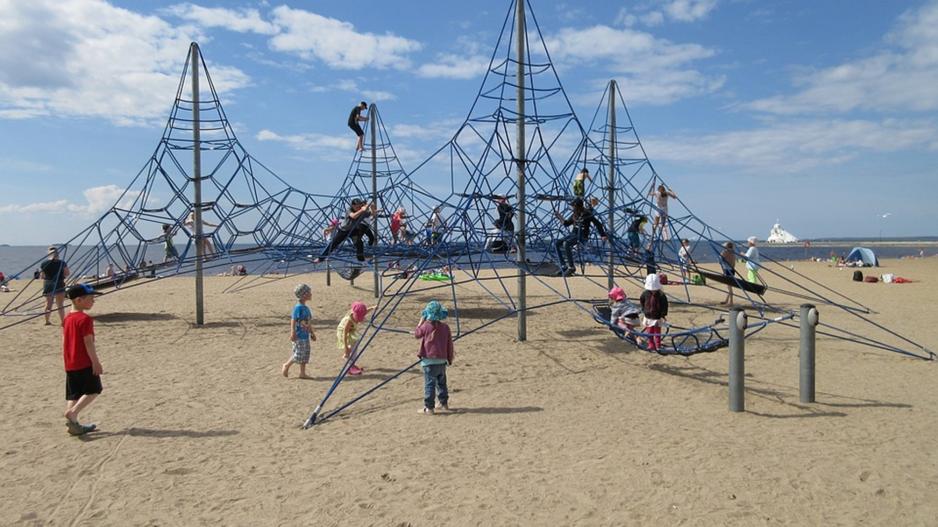
Oulu, Finland. (Photo: Nallikari, Oulu)
The panellists and the audience concluded that talking about the future of the Arctic is hard, but very necessary. Scenarios provide the frame and common starting point for discussion inclusive of the Arctic stakeholders and all aspects of sustainability, social, economic, and environmental ones.
You can view the recording of the event here.


